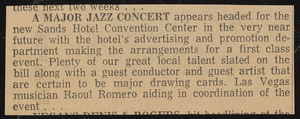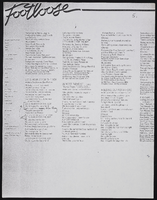Search the Special Collections and Archives Portal
Search Results
George Durkin oral history interview
Identifier
Abstract
Oral history interview with George Durkin conducted by Claytee D. White on July 26, 2024 for the Boyer Early Las Vegas Oral History Project. In this interview, Durkin describes his childhood in Schenectady, New York, where he first became interested in music. After college, Durkin enrolled in a master's program at the University of Nevada, Las Vegas (UNLV) and worked at Strip locations behind some of the great entertainers in the industry. While at UNLV, he studied with composer, arranger, and musician Don Hannah, and became a life-long friend of his son, Paul Hannah. Durkin explains that while he currently works in real estate, he still plays in shows when possible and is a regular percussionist for the Las Vegas Philharmonic. Over the years, Durkin played for many entertainers in Las Vegas, including Robert Goulet, Dorothy Hamill, Julio Iglesias, Dionne Warwick, Liberace, Joan Rivers, Sammy Davis, George Burns, and many more. Digital audio available; no transcript available.
Archival Collection
Hyman Gold Papers
Identifier
Abstract
The Hyman Gold Papers (1935-2004) primarily document the career of Las Vegas, Nevada performer Hyman Gold, and consist of newspaper clippings from various engagements, correspondence, and fliers. Materials also include handwritten musical scores and reel to reel tapes, both from his personal and professional life.
Archival Collection
Eddie Hall Holzman oral history interview
Identifier
Abstract
Oral history interview with Eddie Hall Holzman conducted by Lisa Gioia-Acres on October 02, 2008 for the All That Jazz Oral History Project. Holzman begins the interview talking about his growth as a musician while living and performing in New Jersey and New York. He also discusses his time playing while enlisted in the military, until he moved to Las Vegas, Nevada in 1947 where he played in a jazz band. Holzman also describes working as a card dealer at the Thunderbird Hotel and Casino, the Desert Inn Hotel and Casino, and the El Rancho Hotel and Casino. He also details the music scene in Las Vegas from the 1950s through the end of his playing career.
Archival Collection
Series III: Sheet music, undated
Level of Description
Scope and Contents
The sheet music series is composed entirely of undated sheet music related to shows performed by Minsky's Burlesque, with a focus on the original show at the Dunes Hotel in Las Vegas, Nevada. The bulk of the materials is hand-copied orchestral scores, many annotated with conductor and musician notes.
Archival Collection
Collection Name: Minsky's Burlesque Records
Box/Folder: N/A
Archival Component
Si Zentner Collection of Music Scores
Identifier
Abstract
The Si Zentner Collection of Music Scores consists of copyright agreements and original music scores from the career of musician Si Zentner. The manuscripts span from 1957 through 1996.
Archival Collection

Meeting minutes for Consolidated Student Senate University of Nevada, Las Vegas, November 15, 1984
Date
Archival Collection
Description
Text
Kim Sisters Photographs
Identifier
Abstract
The Kim Sisters Photographs depict the Korean entertainers the Kim Sisters in Las Vegas, Nevada and South Korea from 1950 to 1988. The photographs depict the Kim Sisters performing, gambling in Las Vegas, and with their family members.
Archival Collection
Claude, Buddy, and Skip Trenier oral history interview
Identifier
Abstract
Oral history interview with Claude, Buddy, and Skip Trenier conducted by Betty Rosenthal on March 10, 1978 for the UNLV University Libraries Oral History Collection.
In this interview, Claude, Buddy, and Skip Trenier, members of the musical group "The Treniers", discuss their experiences performing on the Las Vegas Strip as Black men. They share their group's history playing music at the Flamingo Hotel and Casino and other establishments in Las Vegas, Nevada beginning in 1948. Their discussion covers not only their performing careers but also their experiences with desegregation, racism, and discrimination in the city of Las Vegas.
Claude, Buddy, and Skip Trenier share their accounts of both being a popular act in Las Vegas, requested by out-of-towners from New York and Chicago, and also how they were nearly fired for refusing to play music when noticing customers of color being treated unfairly at their shows. The trio talk about how they could not enter casinos from the front entrance, how most casinos did not formally desegregate until after 1960, and how there were very few Black entertainers, musicians, or dancers during the mid-20th century with a few notable exceptions including Sammy Davis Jr.
Archival Collection


